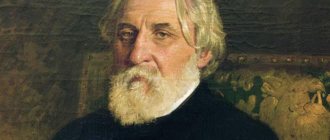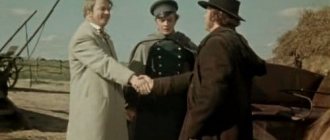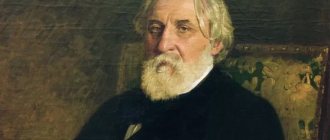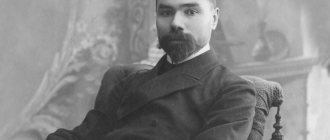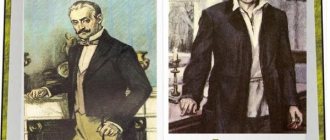What is the meaning of the ending?
What is the meaning of the ending?
The satirical story “Heart of a Dog” by Mikhail Afanasyevich Bulgakov was created in 1925. Its plot is based on a description of the fatal and tragic experiment of Professor Philip Filippovich Preobrazhensky to transplant human internal organs into a dog.
The donor for the operation was a young man named Klim Chugunkin, who died from a knife wound. What was remarkable about this citizen was that during his lifetime he was an avid drunkard and rowdy, and also had two criminal records. It is precisely this kind of personality that the yard dog Sharik, to whom Chugunkin’s pituitary gland and genitals were transplanted, subsequently turns into.
Now the creature, obtained through the artificial synthesis of two seemingly incompatible biological species, calls itself Poligraf Poligrafovich with the “hereditary” surname Sharikov. It tries with all its might to gain a foothold in human status and to be “like everyone else”: “What, am I worse than people?” And he partially succeeds, because with the help of the chairman of the house committee, Shvonder, Sharikov even receives documents and a job position.
But with his behavior, Poligraf Poligrafovich demonstrates a complete lack of humanity. He is rude, uses foul language, drinks vodka, pursues women and encroaches on Preobrazhensky’s living space. All desperate attempts to somehow re-educate the new resident, made by Dr. Bormenthal and the professor, invariably fail.
As a result, Sharikov writes a denunciation against his creators, and then even threatens them with a revolver. Preobrazhensky and Bormental have no choice but to twist this unfortunate man, put him to sleep with chloroform and perform the reverse operation, after which he again becomes a dog.
Thus, the work ends with the complete victory of scientists over Sharikov. At the end of the story, Preobrazhensky utters the following words: “Science does not yet know a way to turn animals into people.” The “beast” here does not mean the dog Sharik at all; the real meaning of this statement is much deeper. So Bulgakov is trying to convey to the reader that, despite the set of seemingly typical human signs (upright walking, speech, the presence of a name, identity card and living space), a creature that does not have any moral principles and spiritual basis cannot be considered a person .
At the end of the story, Preobrazhensky artificially interrupts the path of existence of his creation in the form of a man, since the professor realizes that neither Sharikov, nor his ancestor Klim Chugunkin, nor many other people who have forgotten what moral values are, would never have been able to evolve. The fact that scientists managed to successfully eliminate the consequences of an unsuccessful experiment does not prevent the reader from seeing the full potential danger of such experiments. Bulgakov also tells us about this at the end of his work. In his understanding, with the Bolsheviks coming to power, such a terrible experiment was carried out not only on a person, but also on Russian society, and on our country as a whole.
see also: Summary of Heart of a Dog, Bulgakov Brief biography of Mikhail Bulgakov
I.S. Turgenev. "Fathers and Sons". The artistic power of the last scenes of the novel.
ARTISTIC POWER OF THE LAST SCENES OF
I. S. TURGENEV’S NOVEL “FATHERS AND CHILDREN”
(CHAPTER 27 AND EPILOGUE).
Objectives
:
show the emotional impact of the last chapters of the novel; help students imagine the hopeless situation in which Bazarov found himself, whether the hero’s illness and death were accidental, what is Turgenev’s attitude towards his hero; reveal the positive qualities of Bazarov, which manifested themselves with particular force in the last hours of his life (courage, willpower, loyalty to his convictions, love of life, woman, parents, mysterious Motherland).
Bazarov and parents.
1. Parents of E. Bazarov. Who are they?
The old Bazarovs are simple people, living out their lives in a small house under a thatched roof.
They idolize their son and are proud of him. Vasily Ivanovich Bazarov is a tall, “thin man with tousled hair.” He is a commoner, the son of a sexton, who became a doctor. He was awarded the order for the fight against the plague epidemic. Trying to keep up with the times, to get closer to the younger generation. Arina Vlasevna is a “round old lady” with “chubby hands.” She is sensitive and pious and believes in omens. The author paints her image: “a real Russian noblewoman of the past,” who should have lived “for two hundred years.” The arrival of dear “Enyusha” excited her and filled her entire being with love and care.
2. What role did the parents play in raising their son? How do they look at his activities now?
They helped Evgeniy in any way they could, they felt his uniqueness
3. How does Bazarov relate to his parents?
Bazarov understands that it is impossible to “remake” parents.
He loves them for who they are (although the difference in views is obvious). Bazarov contrasts his parents with high society: “...People like them cannot be found in your big world during the day,” he tells Odintsova.
But nevertheless, in communication with his mother and father, the son is “angular and helpless”: neither caress nor calms down. He is often silent and does everything possible to hide away and suppress the feeling of filial love in himself. After all, love, both filial and parental, according to Bazarov’s concepts, is a “feigned” feeling.
The author thinks differently.
He sympathizes with the old Bazarovs. And he considers the feelings of parental and filial love to be “the most holy, devoted” feelings. The writer makes you think about dear people - mother and father.
Expressive reading of a passage about the death of Bazarov
1. What thoughts and feelings does Bazarov evoke in the death scene?
Admiration for strength of character, mental fortitude, courage, and the ability to hold on to the end.
2. Establish the cause of the hero’s illness and death.
It seems that infection during an autopsy is an accident, but in fact it is not. At work, in the pursuit of knowledge of the not yet known, Bazarov is overtaken by death.
D.I. Pisarev:
“The whole interest, the whole meaning of the novel lies in the death of Bazarov... The description of Bazarov’s death is the best place in Turgenev’s novel; I even doubt that there is anything remarkable in all the works of our artist.”
A.P. Chekhov:
“What a luxury - “Fathers and Sons”! Just at least shout guard. Bazarov's illness was so severe that I became weak, and it felt as if I had become infected from him. And the end of Bazarov?.. The devil knows how it was done. Simply brilliant."
Do you agree with these statements by Chekhov and Pisarev?
4. What is Turgenev’s attitude towards his hero?
I. S. Turgenev:
“I dreamed of a gloomy, wild, large figure, half grown out of the soil, strong, evil, honest - and yet doomed to destruction - because it still stands on the threshold of the future.”
The writer’s attitude towards Bazarov was not entirely clear: Bazarov was his “enemy”, towards whom he felt an “involuntary attraction”. The writer did not believe that people of Bazarov’s type would “find a way to renew Russia” (D.K. Motolskaya).
I. S. Turgenev:
“If the reader does not love Bazarov with all his rudeness, heartlessness, ruthless dryness and harshness, if he does not love him... I am guilty and have not achieved my goal.” These words contain the writer’s love for his hero.
The epilogue helps to understand
the meaning of the novel . In the epilogue, the author describes Bazarov’s grave and says that the flowers on the grave “speak of eternal reconciliation and endless life...”. Most likely, Turgenev meant that the disputes between “fathers and sons” are eternal. It is from these disputes, clashes that speak about the development of humanity and philosophical thought that life consists.
5. Tell us how Bazarov’s loneliness gradually grows in clashes with the people around him.
According to M. M. Zhdanov, Turgenev, depicting Bazarov’s superiority over others, psychologically very subtly and convincingly shows his loneliness. The break with the Kirsanovs occurred due to ideological differences, with Anna Sergeevna - on the basis of unrequited love, the hero despises Kukshina and Sitnikov, Arkady by his nature is not capable of great things, the old Bazarovs and their son are people of different generations, and the difference in their development is great , with ordinary people - alienation.
Thus, the author shows Bazarov isolated from the environment, lonely, and shows the hero’s doom.
D.I. Pisarev
considers Bazarov’s death heroic, akin to a feat. He writes: “To die the way Bazarov died is the same as accomplishing a great feat.”
“...But looking into the eyes of death, foreseeing its approach, without trying to deceive it, remaining true to yourself until the last minute, not weakening and not becoming cowardly is a matter of strong character.” Is Pisarev right in assessing Bazarov’s death as a feat?
7. How might his fate have turned out?
8. What qualities of Bazarov manifested themselves with particular force in the last hours of his life? For what purpose did he ask his parents to send for Odintsova?
We can probably say that Bazarov is dying of loneliness. Being in a state of deep mental crisis, he is negligent in autopsy and does not do anything in time to reduce the possibility of infection. The courage with which Turgenev's hero meets his death testifies to the true originality of his nature. Everything superficial and external disappears in Bazarov, and a person with a loving and even poetic soul is revealed to us. Bazarov admired Odintsova; he no longer considered it necessary to fight the feeling of love.
In the image of Bazarov, Turgenev typifies such wonderful qualities of new people as will, courage, depth of feelings, readiness for action, thirst for life, tenderness.
9. Why doesn’t the novel end with the death of the hero?
Turgenev ended Evgeny's fate with death, but the novel does not end there.
The author ends the novel with an epilogue , in which he talks about how the fates of the heroes of the novel turned out after Bazarov's death. And we see that everyone (with the exception of old parents and kind Katya, who sometimes remembers Evgeniy) continues to live as if there was no Bazarov at all. By this , Turgenev shows that Eugene achieved nothing in this life, was not remembered by those around him, but, on the contrary, was quickly forgotten. The outcome of Bazarov’s life involuntarily recalls the lines of Lermontov: We will pass over the world in a crowd without noise or trace. Neither the centuries abandoned, nor the fertile thought, nor the work begun by the genius.
10. Does bazaarism exist these days?
In the epilogue, I. S. Turgenev writes: “No matter what passionate, sinful, rebellious heart hides in the grave, the flowers growing on it serenely look at us with their innocent eyes; They tell us not only about eternal peace, about that great peace of “indifferent” nature; they also talk about eternal reconciliation and endless life..."
Excited voice of the author!
Turgenev talks about the eternal laws of existence that do not depend on man. The writer convinces us that going against these laws is madness. In the novel, what is natural wins: Arkady returns to his parents’ home, families are created... And the rebellious, tough, prickly Bazarov, even after his death, is still remembered and loved by his aging parents.
Homework.
Written answer:
Why is I. S. Turgenev’s novel “Fathers and Sons” and its hero interesting to today’s reader?
so UNT / Russian literature / Lesson plans for Russian literature grade 10
Lesson 81 ARTISTIC POWER OF THE LAST SCENES OF I. S. TURGENEV’S NOVEL “FATHERS AND CHILDREN” (CHAPTER 27 AND EPILOGUE)
29.03.2013 18365 0
Lesson 81 ARTISTIC POWER OF THE LAST SCENES OF I. S. TURGENEV’S NOVEL “FATHERS AND CHILDREN” (CHAPTER 27 AND EPILOGUE)
Goals:
show the emotional impact of the last chapters of the novel; help students imagine the hopeless situation in which Bazarov found himself, whether the hero’s illness and death were accidental, what is Turgenev’s attitude towards his hero; reveal the positive qualities of Bazarov, which manifested themselves with particular force in the last hours of his life (courage, willpower, loyalty to his convictions, love of life, woman, parents, mysterious Motherland).
During the classes
I. Individual messages from students on the topic “Bazarov and Parents” or a conversation on the following questions:
1. Parents of E. Bazarov. Who are they? (The old Bazarovs are simple people, living out their lives in a small house under a thatched roof. They idolize their son and are proud of him. Vasily Ivanovich Bazarov is a tall “thin man with tousled hair.” He is a commoner, the son of a sexton, who became a doctor. For the fight against awarded an order during the plague epidemic. Tries to keep up with the times, to get closer to the younger generation. Arina Vlasevna is a “round old lady” with “chubby hands.” She is sensitive and pious, believes in omens. The author paints her image: “a real Russian noblewoman of the old days “, who should have lived “over two hundred years.” The arrival of dear “Enyusha” excited her, filled her entire being with love and care.)
2. What role did the parents play in raising their son? How do they look at his activities now? (They helped Evgeniy in any way they could, they felt his uniqueness.)
3. How does Bazarov relate to his parents? (Bazarov understands that it is impossible to “remake” his parents. He loves them as they are (although the difference in views is obvious). Bazarov contrasts his parents with high society: “... People like them cannot be found in your big world during the day.” ", he says to Odintsova. But nevertheless, in communication with his mother and father, the son is “angular and helpless": neither caress nor calms down. He is often silent and does everything possible to hide away, suppress the feeling of filial love in himself. After all, love, both filial and parental, according to Bazarov’s concepts, is a “feigned” feeling.
The author thinks differently. He sympathizes with the old Bazarovs. And he considers the feelings of parental and filial love to be “the most holy, devoted” feelings. The writer makes you think about dear people - mother and father.)
II. Expressive reading of a passage about the death of Bazarov
(with minor abbreviations).
III. Conversation with students on the following questions:
1. What thoughts and feelings does Bazarov evoke in the death scene? (Admiration for strength of character, mental fortitude, courage, ability to hold on to the end.)
2. Establish the cause of the hero’s illness and death. (It seems that infection during an autopsy is an accident; in fact, this is not so. At work, in the quest for knowledge of the not yet known, Bazarov is overtaken by death.)
3. D. I. Pisarev:
“The whole interest, the whole meaning of the novel lies in the death of Bazarov... The description of Bazarov’s death is
the best place in
Turgenev’s novel; I even doubt that there is anything remarkable in all the works of our artist.”
A. P. Chekhov:
“What a luxury - “Fathers and Sons”! Just at least shout guard. Bazarov's illness was so severe that I became weak, and it felt as if I had become infected from him. And the end of Bazarov?.. It’s the devil knows how it was done. Simply brilliant."
Do you agree with these statements by Chekhov and Pisarev?
4. What is Turgenev’s attitude towards his hero?
I. S. Turgenev:
“I dreamed of a gloomy, wild, large figure, half grown out of the soil, strong, evil, honest - and yet doomed to destruction - because it still stands on the threshold of the future.”
The writer’s attitude towards Bazarov was not entirely clear: Bazarov was his “enemy”, to whom he felt an “involuntary attraction”
. The writer did not believe that people of Bazarov’s type would “find a way to renew Russia” (D.K. Motolskaya).
I. S. Turgenev:
“If the reader does not love Bazarov with all his rudeness, heartlessness, ruthless dryness and harshness, if he does not love him...
I am guilty
and have not achieved my goal.” In these words, in my opinion, the writer’s love for his hero.
5. Tell us how Bazarov’s loneliness gradually grows in clashes with the people around him. (According to M. M. Zhdanov, Turgenev, depicting Bazarov’s superiority over others, psychologically very subtly and convincingly shows his loneliness. The break with the Kirsanovs occurred due to ideological differences, with Anna Sergeevna - on the basis of unrequited love, the hero despises Kukshina and Sitnikov, Arkady by their nature, they are not capable of great things, the old Bazarovs and their son are people of different generations, and the difference in their development is great, with ordinary people there is alienation [7].
Thus, the author shows Bazarov isolated from the environment, lonely, and shows the hero’s doom.)
6. D. I. Pisarev
considers Bazarov’s death heroic, akin to a feat. He writes: “To die the way Bazarov died is the same as accomplishing a great feat.” “...But looking into the eyes of death, foreseeing its approach, without trying to deceive it, remaining true to yourself until the last minute, not weakening and not becoming cowardly is a matter of strong character.” Is Pisarev right in assessing Bazarov’s death as a feat?
7. How might his fate have turned out?
8. What qualities of Bazarov manifested themselves with particular force in the last hours of his life? For what purpose did he ask his parents to send for Odintsova? (We can probably say that Bazarov is dying of loneliness. Being in a state of deep mental crisis, he is negligent in autopsying the corpse and does not do anything
to reduce the possibility of infection.
The courage with which Turgenev's hero meets his death testifies to the true originality of his nature. Everything superficial and external disappears in Bazarov, and a person with a loving and even poetic soul is revealed to us. Bazarov admired Odintsova; he no
considered it necessary to fight the feeling of love.
In the image of Bazarov, Turgenev typifies such wonderful qualities of new people as will, courage, depth of feelings, readiness for action, thirst for life, tenderness.)
9. Why doesn’t the novel end with the death of the hero?
10. Does bazaarism exist these days? (In the epilogue, I. S. Turgenev writes: “No matter what passionate, sinful, rebellious heart hides in the grave, the flowers growing on it serenely look at us with their innocent eyes; they tell us not only about eternal peace, about that great the tranquility of an “indifferent” nature; they also talk about eternal reconciliation and endless life..."
Excited voice of the author! Turgenev talks about the eternal laws of existence that do not depend on man. The writer convinces us that going against these laws is madness. In the novel, what is natural wins: Arkady returns to his parents’ home, families are created... And the rebellious, tough, prickly Bazarov, even after his death, is still remembered and loved by his aging parents.)
Homework.
1. Read the article by D.I. Pisarev “Bazarov”.
2. After reading the article, answer the questions:
1) What are the fundamental properties of the Bazarov type?
2) What, according to Pisarev, is the author’s attitude towards the Bazarov type in general and towards the death of the hero in particular?
3) What, from Pisarev’s point of view, controls Bazarov’s behavior?
4) How does Bazarov compare with the heroes of the previous era?
3. Written answer (individual assignment): Why is I. S. Turgenev’s novel “Fathers and Sons” and its hero interesting to today’s reader?
4. Write down interesting statements about the novel by literary critics N. N. Strakhov, V. Yu. Troitsky. Which of them, in your opinion, are closer to Turgenev’s point of view on his hero? Which ones should you argue with?
lesson plan, 10th grade, Russian literature
The meaning of the ending of a dramatic work. (Using the example of one of the plays of Russian literature of the 20th century)
| Item: | Literature |
| Kind of work: | Essay |
| Language: | Russian |
| Date added: | 21.02.2019 |
- This type of work is not scientific work, it is not a finished work!
- This type of work is a finished result of processing, structuring and formatting collected information intended for use as a source of material for independent preparation of educational work.
If you have a hard time understanding this topic, write to me on WhatsApp, we’ll look into your topic, agree on a deadline, and I’ll help you!
Using this link you can find literature abstracts on any topic and see how they are written:
| Many ready-made topics for literature essays |
Check out these similar threads, they might be useful to you:
| Poem by A.T. Tvardovsky “The whole essence is in one single covenant...” |
| The role of internal monologue in creating a hero's character |
| Features of the poem genre in the works of M.Yu. Lermontov. (Based on the example of one work) |
| The theme of family in one of the works of Russian literature |
Introduction:
Perhaps none of the main works of the twentieth century has caused as many contradictions and discrepancies as the epic novel by M. A. Sholokhov “Quiet Don”. The significance of the historical period depicted in the novel shows the life of people in its diversity, in the struggle of interests of different strata of society, in the complex interweaving of the fate of many characters - all this attracts the reader, who goes through the difficult years of Russian history with the heroes. But what worries us most is the tragic image of Grigory Melekhov. And special attention is always paid to the final scene of the novel. How and how does the story about the difficult life of the hero end?
In the image of Grigory Melekhov, Sholokhov showed complex, painful experiences, revealed the complexity and inconsistency of the thoughts and actions of the “individual”, complicated by the specifics of the life and way of life of the Don Cossacks, as a result of which he realized that “you cannot live in the old way.”
The end of the novel sums up a great period in the hero's life. We don't know what will happen to him. The final scene is the result of Melekhov’s life. But we continue to worry about the fate of this hero. The novel does not directly indicate that Gregory’s future life will be inextricably linked with the life of the entire Cossacks, who have begun a new life. However, it is obvious that Gregory returned to his homeland, to the land that he so missed during his stormy wanderings in search of truth and truth. The hero returned to work on it to raise his children: “And Gregory, for the first time during his stay in the forest, smiled slightly noticeably: “Home.”
The meaning of the ending of M.A. Sholokhov’s novel “Quiet Don”
Sholokhov's innovation in resolving a tragic conflict lies in the fact that he does not show the tragic outcome for the hero, inevitable for all tragedies of the past. In "Quiet Don" there is neither the spiritual death of the hero nor his physical death. Melekhov courageously goes to his native farm before the amnesty, and this gives grounds to assert that Grigory Melekhov retained moral strength and the opportunity to start a different life, without violence and death.
Gregory's arrival at his native farm is quite natural. Melekhov long strived for peaceful work, for his family. And these aspirations of his stem from an ideal of life that is not much different from the ideal of most people from the Cossacks and the peasantry in general.
Grigory Melekhov, despite all the mistakes, delusions, suffering and torment, at the end of the novel appears as a man who is not afraid of possible retribution for his deeds. He can no longer tolerate the “groundhog situation” in which (temporarily!) he was among the “peaceful robbers.” He assumes, of course, that he can expect him upon his return to the farm. Meanwhile, in the end, many advise the hero to “wait a little,” because by the first of May there will be an amnesty.
And people like Gregory will be forgiven by the Soviet government. If Melekhov hesitated, feared retribution and remained in the forest awaiting amnesty, in this case one could say: “Yes, Grigory is not the same, he is broken and confused.” But in the novel everything is different. Melekhov was simply tired of blood, suffering, and loss. He wants one - at home. That's why he comes back. Returns forever
Sholokhov is a brilliant master of details. It is enough to recall the scene when Melekhov last saw Natalya, the wife who saw him off. In her hand is a black scarf. And the wave of that black scarf is the last thing Gregory will remember.
So in the final scene of the novel. Every detail is important here. The action takes place in the spring. This is the time of transition from one (dead) state to another (life). Gregory breaks the ice to throw the weapon. This is probably the only moment when he feels relief. Melekhov “carefully wiped his hands” after throwing away the weapon. And this is also symbolic. He would never be able to take up arms again.
Pure Don water is also a unique symbol of new life. But Gregory faces another loss. From his son, he learns that his daughter died of “lous.” And the little Father remains in life only as his father, who will lift him up in his arms, and together they will go to his native farm, to the land, to work.
Grigory Melekhov, having experienced many disasters, suffered many losses, having experienced a lot of physical torment and suffering, comes to his native farm, and we see the joy that gripped him at the sight of his native village, the joy of meeting his son. The end of the novel indicates that the hero has not exhausted himself in his internal state.
Therefore, I would like to end with a phrase from Sholokhov’s story “The Fate of a Man”: “And I would like to think that this Russian man, a man of unbending will, will stretch out and grow up next to his father’s shoulder, who, having matured.
What is the ideological meaning of the ending of the epic “Quiet Don” by Sholokhov?
I will try to answer the question, taking into account the real events associated with the writing of the ending.
In the process of reading the novel “Quiet Don”, each of us follows the path of disaster. It should be borne in mind that the fourth volume, in which the tragedy of the war unfolded in full, was created in the most difficult conditions (not only for Sholokhov, but for the entire country raped by the Soviet government).
The first three volumes were written from 1925 to 1932, published in 1928-1932. The last volume was completed in 1940, published in 1937-1940. Now think: Sholokhov wrote three volumes in seven years, and then the fourth in the same seven years. Why so long?
The main question asked of the writer by the Soviet regime: will Melikhov become an exemplary Bolshevik? As the ending suggests, the answer is no. And it was more than logical.
Sholokhov lived his entire life in the same place where he was born - in the village of Vyoshenskaya. As you know, in the thirties this region experienced all the “delights” of collectivization, famine and repression. Imagine yourself in the place of Sholokhov, who saw with his own eyes the misfortune of his compatriots, and was himself under threat of arrest.
The writer maintained an active correspondence with Stalin and wrote him angry letters exposing the bloody regime (you can find them and see for yourself). He wrote about torture, abuse of party leaders and local excesses. From them one can judge the powerful emotional wave that arose as a result of the events around Sholokhov and caused him the need to end the novel with tragic notes, taking Grigory Melikhov away from the party to his homeland.
To complete the line of the first three volumes, Sholokhov brought to the end the logic of the destructive power of war.
“It’s amazing how life has changed in the Melekhov family! .. There was a strong, well-bred family, and everything changed since spring... The family broke up before Pantelei Prokofievich. They were with the old woman together. Suddenly and quickly, family ties were severed, the warmth of relationships was lost, and notes of destructiveness and alienation still slipped into the conversation. They sat at the common table not as before, like a close-knit and friendly family, but like random people. The war was the whole reason..."
And after Sholokhov “finishes” the readers with how, with respect and bitterness, Grigory Melikhov buries his Aksinya “in the bright morning light.”
Already in the grave, he folded her deathly white dark hands on his chest in a cross, covered his face with a handkerchief so that the earth would not fall asleep half-open, motionless fixed in the sky and already begin to fade. He said goodbye to her, firmly believing that they had parted for a while.
With his palms he carefully pressed the wet yellow clay against the grave and knelt for a long time near the grave, bowing his head, swaying gently. Now he didn't need to rush. It was all over."
Conclusion
In my opinion, the tragic conspiracy is a direct consequence of the political situation of the thirties. Sholokhov could not write the ending about a future bright future, because heaven cannot be built on bones, especially if you see how your compatriots turn into these very bones.
Literary figures note that in many of Sholokhov’s works, in the finale the soldier holds a boy in his arms: “The Seed of Shibalkovo”, “Quiet Don”, “The Fate of a Man”. Melikhov comes to his son, to his home, and for the writer this is the sacralization of family ties, the cycle of time becomes looped in this.
Exhausted, suffering from torture and loss, graying with time to the point of horror, the older generation turns to the younger in the hope that a series of sufferings will not befall them. A child in the arms of an adult man is a symbol of protection, protection, salvation.
What is the ideological meaning of the ending of the novel “Eugene Onegin”
Poetic work by A.S. Pushkin went down in world and domestic history as an incredibly interesting and unique novel. It attracts attention with a number of features: bright, well-thought-out images of the characters, an exciting plot with new, unusual for its time, scenery and locations. Another detail thanks to which the novel received a well-deserved description of innovative is the open ending played out by the author in the final, ninth chapter. It was this detail, the so-called “aesthetic discovery,” that gave the novel, according to Yu.M. Lotman, such a force that affected the entire genre of the Russian novel in the 19th century.
So what goals did Alexander Sergeevich himself pursue when creating the finale of his greatest work? What idea did he put into it, what did he strive to convey to his modern and future reader?
The eighth chapter of the novel “Eugene Onegin” contains rapidly developing events that are built around the relationship between Onegin, who returned from his trip, and the mature, stately Princess Tatiana. Seeing a well-mannered, charming lady who has grown from the silent, dreamy girl whom he once so coldly rejected, Onegin is literally overwhelmed by the avalanche of feelings that befall him. It is this emotional storm that becomes the driving force of the final chapter and leads to a sad ending.
Eugene sends three letters to his beloved, none of which receive an answer. The long winter months drag on in painful anticipation and reflection, and with the onset of spring, the hero rushes to Tatyana in person, falling on his knees before her. This is his breaking point, the very moment when the further fate of the hero must be decided. But Tatyana herself has already experienced similar “points”: Onegin’s answer, marriage to a wealthy general. Her life has already been decided and there is no place in it for old feelings, no matter how strong they may be now. This is the terrible tragedy of Onegin: he again remained on the sidelines, an extra person, was late and irrevocably lost what he had once so mercilessly rejected.
But despite all the drama, Alexander Sergeevich leaves free space for the reader’s thoughts. Although Onegin has already been punished by Tatyana herself, bright moments can still happen in his life. A big stage has been completed, what will happen next to the young hero? Perhaps he, like many lost people from his generation, will join the Decembrist movement in an attempt to find at least some purpose for existence. Or perhaps Evgeniy will decide to go to the Caucasus and lose himself in military craft along with the same desperate souls. But such an ending can mean not only the end of one stage and the beginning of a new one: perhaps for Evgeny this is the end of his entire life, because all his expectations and hopes have turned to ashes. With a high probability, he can continue his aimless wanderings, idle and, like Pechorin, out of boredom, unceremoniously squeeze into other people's lives and destroy them.
Now that the last threads connecting Onegin with the former metropolitan world have been severed, all paths are open to the young man, but will he choose his own? Like Lensky, he can both rise and fall to the very bottom. The ideological meaning of the ending of this novel is diverse and changeable, and its interpretation depends on the reader or critic himself. A.S. Pushkin completes his work, but the story of the heroes he created continues to take its course, which brings it even closer to the real thing, which can happen not only on the pages of books, but also with ordinary people.
